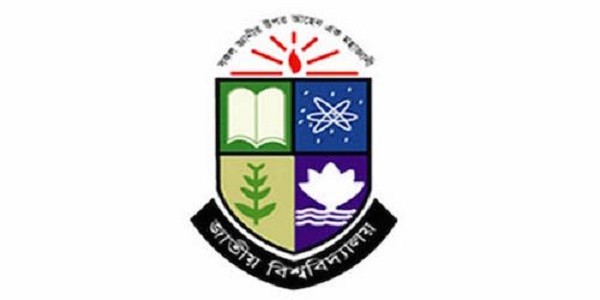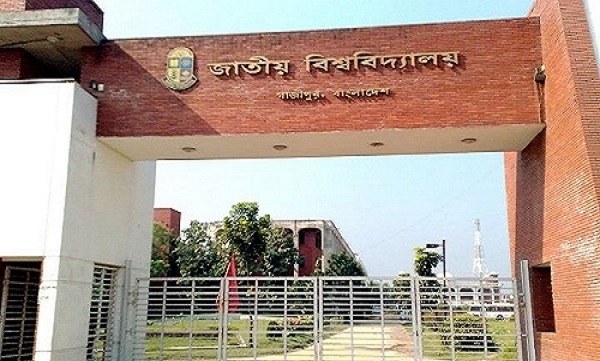English First Paper Subject Code-108
Class Seven
Full Marks-80 Time-3Hours
Answer all the questions .Figures in the margin indicate full mark
Section A: Reading (Total Marks 40)
1.Read the following text and answer the question that follows.
Baishaki Mela is a part and parcel of Bengali culture. It is perhaps the largest and most comprehensive celebration of the arena of our culture. It is held in the 1st day of the Bengali month Baishak. The Bangalees all look forward to celebrate this day throughout the year. The Ramna Batamool is the centre around which New yerar celebration have spread around the city and gradually across the country. This festival bears exhibition, music, poetry, crafts, photography, theatre etc. in the urban area. A Baishaki Mela is an annual gathering. It is one of the chief attraction of the rural area too. Some fair are held for a day and some for two or even more days. It is generally held in the open place or on the bank of a river or a canal. All men, woman, and children gather in the Baishaki mela in a large number. Fency goods, toys, ballons, flutes, sweets and wooden things are mostly sold in this mela. Circus parties are also a common feature in a Baishaki Mela. They often bring trained elephants, horses, monkeys, bears to entertain the spectators. Itis a matter of pride that we celebrate our cultural identity in a true sprit through Baishaki Mela.
Question: Guess the meaning of the following words used in the text above. 0.5×10=5
i.Wealth a)property b)capitalist c)prosper d)rear
- difficult a)easy b)complete c)hard d)calm
iii.build a)found b)destruct c)ruin d)spoil
iv.properly a)fitly b)daily c)hardly d)easily
v.remain a)remove b)keep c)stay d)put off
- control a)easy b)regulate c)direct d)moody
vii.respect a)disregard b) honor c)fearful d)dishonor
viii. feeling a) emotion b)affection c)impression d)dimention
ix.maintain a)keep up b)refuse c)deny d)hastened
- exercise a)practice b)use c)found d)try
- Read the text and answer the questions. 2X5=10
After inventing dynamite, Swedish-born Alfred Nobel became a very rich man. However, he foresaw its universally destructive powers too late. Nobel preferred not to be remembered as the inventor of dynamite, so in 1895, just two weeks before his death•, he created a fund to be used for awarding prizes to people who had made worthwhile contributions to humanity. Originally there were five awards: literature, physics, chemistry, medicine, and peace. Economics was added in 1968, just sixty-seven years after the first awards ceremony.
Nobel’s original legacy of nine million dollars was invested, and the interest on this sum is used for the awards which vary from $30,000 to $125,000.
Every year on December 10, the anniversary of Nobel’s death, the awards (gold medal, illuminated diploma, and money) are presented to the winners. Sometimes politics plays an important role in the judges’ decisions. Americans have won numerous science awards, but relatively few literature prizes.
No awards were presented from 1940 to 1942 at the beginning of World War 11. Some people have won two prizes, but this is rare; others have shared their prizes.
Questions:
- What is must for everyone?
- How is our life measured?
- Who are remembered after death?
- Who are not remembered after death?
- What should we do for the benefit of mankind?
- Read the text and answer the following questions.
Albert Einstein was born at Ulm, in Württemberg, Germany, on March 14, 1879. Six weeks later the family moved to Munich, where he later on began his schooling at the Luitpold Gymnasium. Later, they moved to Italy and Albert continued his education at Aarau, Switzerland and in 1896 he entered the Swiss Federal Polytechnic School in Zurich to be trained as a teacher in physics and mathematics. In 1901, the year he gained his diploma, he acquired Swiss citizenship and, as he was unable to find a teaching post, he accepted a position as technical assistant in the Swiss Patent Office. In 1905 he obtained his doctor’s degree.
A. Complete the following table with the information given in the passage. 0.5×10= 5
| A | B |
| 1.Born in(month) | |
| 2.family moved (time) | |
| 3. family moved(place) | |
| 4.schooling(institution) | |
| 5.family moved later(place) | |
| 6.continued education (place) | |
| 7.swissfderal polytechnic (year) | |
| 8.diploma(year) | |
| 9.Swiss citizenship (year) | |
| 10.doctor’s degree(year) |
- Read the following statements. Write (T) in your answer script if the statement is true. Write (F) if the statement is false. If false, give the correct answer. 1×5=5
- Albert Einstein was born in Munich .
- The family moved to Munich on April , 1879.
iii.He started his gymnastic education in Aarau
- he entered the Swiss Federal Polytechnic School at the age of 17.
- He acquired Swiss citizenship in 1901.
- Complete the text with the right words in the box. 0.5×10=5
| on | born | A | local | normal | months |
| able | to | Old | fever | deaf | illness |
Helen Adams Keller was (a)—in Tuscumbia, Alabama, (b)—-June 27, 1880. Her parents were Captain Arthur H. Keller and Katherine Adams Keller. Her father was (c)—-veteran of the confederate army. He also was the editor of the(d)—- newspaper, the North Alabamian. Helen was born a (e)—-child. She started speaking when she was six (f)—–old. By the time she was a year old, she was (g)—to communicate with her parents and she had also learned (h)—walk. When Helen was eighteen months (i)—an illness developed that the doctor described as brain congestion. She ran a high (j)—for many days, and then the fever was gone. Helen was left deaf and blind from the illness.
- The texts in column A are the beginnings of some sentences. The extensions are given in Column B and Column C. Match the texts in Column A, B, and C to make complete sentences. 1 x 5= 5
| Column-A | Column-B | Column-C |
| Nazrul
He His poems and songs
|
are
became was killed was was buried |
seriously ill.
rebel poet. brought to Dhaka. the impression of his great nationalistic feelings. Near Dhaka university mosque. |
- Read the texts and rearrange them in correct order: 0.5×10=5
- a) A number of people applied for the job.
b) He wanted to appoint an honest man as his tax collector.
c) Then he found the desired man.
d) Once there lived a sultan in a country.
e) They came through a passage where gold coins were kept.
f) The applicants were asked to meet the sultan one by one.
g) Then he invited applications.
h) All the applicants blushed and refused except one.
i) So, he asked for the wise counselor’s advice.
j) When they all arrived, the sultan asked them to dance. Section B: Writing (Total Marks: 40) - Read the beginning of the following story and complete it in your own way. Give a title to it. 10
Once upon a time, a hungry fox was roaming around here and there searching for food. Because of hunger, he was feeling weak and tired. Fortunately, he came to a garden where he saw a grape-vine laden with bunches of grapes they looked quite ripe and juicy.The fox looked at the grapes with longing eyes and licked his chops. But the bunches were too high for him and he was feeling weak. So he sat down for a while to take some rest. On feeling refreshed, he jumped as high as he could, to get at the grapes. But he failed to reach them. ——————-
- Suppose your you are Rana/Rana of 14Free school Street ,Dhanmondi,Dhaka. Your friend Selim/Selina lives at Ghona, satkhira.Recently you have visited Karamjal, Mongal Write a letter to your friend describing the picnic. 10
- Read the following paragraph and write a dialogue between a teacher and a student how to know about “Good Food” The teacher is teaching the students about good food. He told that for good health , we need good food.The poor and illiterate people do not know about good food. But good food does not mean costly food. To preserve our health , we must take a balanced diet. 10
- Write a paragraph on ‘Your reading room’ in about 150 words. 10






